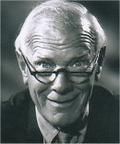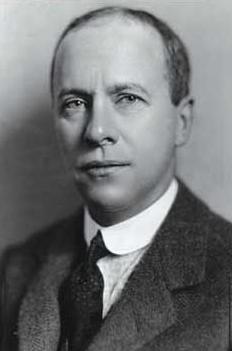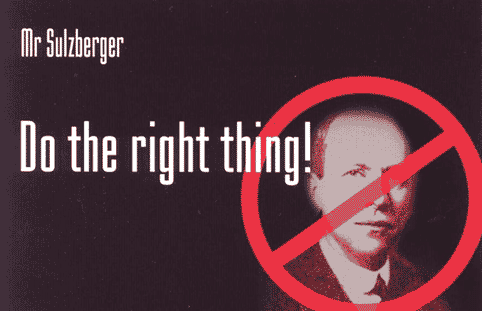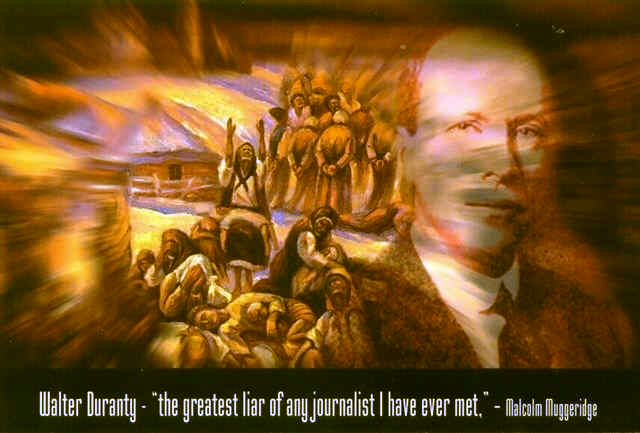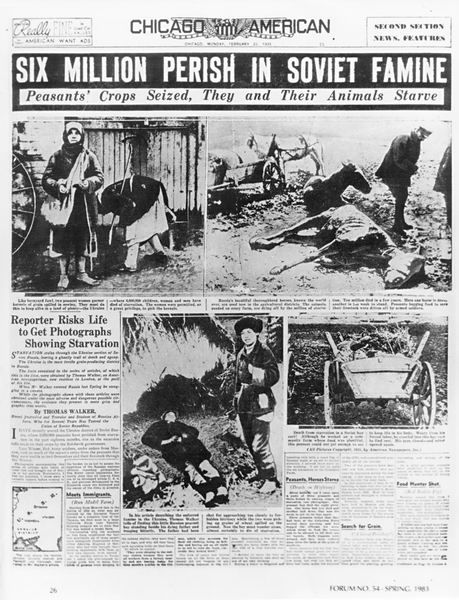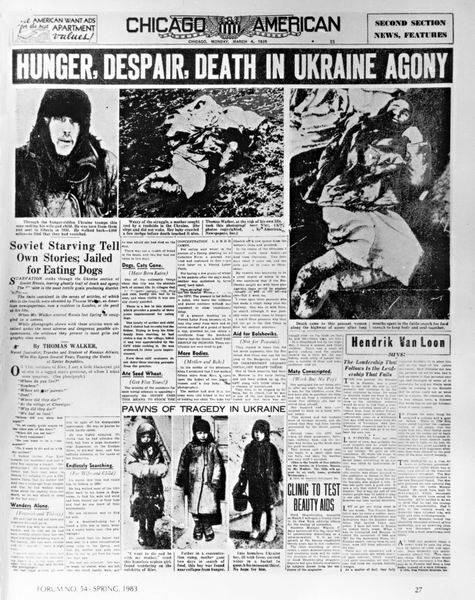The Paper of Record
An apology that is long overdue.
Mr. Stuttaford is a writer living in New York.
May 15, 2001 8:55 a.m.
Imagine, if you can, Berlin in November 1938, the grim capital of a savage ideology heading deeper into horror and cruelty. The New York Times correspondent has just emerged from an interview with the Fuhrer. It is an exclusive. His editor will be pleased. On the way home the Times man passes a looted synagogue, and the broken bodies of those who were worshiping there. Elsewhere, homes and businesses are being ransacked, and their occupants are under attack. Other victims are rounded up and dragged to the concentration camps from which far too few will ever emerge. Filing a report that night, the journalist prefers not to dwell on such distasteful events. Instead he contents himself with a comment that stories of a Kristallnacht pogrom had been exaggerated. Yes, there had been some scattered excesses, but they had been the work of a few hotheads, nothing more.
Delighted by the coverage, the Nazi hierarchy gives the correspondent privileged access. He becomes the doyen of the Third Reich's foreign press corps, the essential contact for every new visitor to Berlin. In the ultimate accolade the journalist wins a Pulitzer Prize for the "scholarship, profundity, impartiality, sound judgment and exceptional clarity" of his reporting from Germany.
In the years that follow, of course, it becomes impossible to deny the reality of Hitler's charnel-house state. The reporter is revealed for what he really was, evil's enabler, a greedy, venal man, whose soothing words had done much to calm the fears of an outside world that might otherwise have tried to step in to stop the slaughter. Amazingly, however, more than 60 years later his Pulitzer still stands, and with it, his distinguished place in the history of the New York Times. Last month, the newspaper, as it does once every year, proudly published the honor roll of its Pulitzer-winning writers. It is not difficult to find the name of the dictator's apologist. It is right up there near the top, fitting company, in the view of the New York Times for the other journalists on the list: Walter Duranty is still, it is clear, a man with whom the Grey Lady is in love.
It is a remarkable, and disgusting, story. Sadly, it is also true, with only one qualification. The journalist, Walter Duranty, was a propagandist for Stalin not Hitler, the evil that he was to witness took place in the Soviet Union, not Nazi Germany.
For well over a decade, Duranty's influential reports from Moscow described a Soviet Union run by a tough, but dedicated, elite, who could, he conceded, be cruel, but only in the cause of improving the lives of the people. As the Times man liked to say, "you can't make an omelet without breaking eggs."
To Duranty, Stalin ("the greatest living statesman") represented progress and the chance of a better future for the once benighted masses. In one typical passage he gushed that, "Stalin and his associates have carried with them the strongest and most intelligent elements of the Russian people, and have created a national unity and enthusiasm which the Tsarist Empire never knew. They have learnt by their own errors and pulled themselves up by their own bootstraps, and the nation has followed them." It was, he wrote, "a heroic chapter in the life of humanity."
That this "heroic chapter" was to prove fatal for large numbers of that same humanity did not seem to trouble Duranty too much. "I'm a reporter," he explained, "not a humanitarian." In fact, he was neither, something that can be seen most clearly from his treatment of the Ukrainian famine of 1932-3. This man-made famine, a deliberate attempt to break the Ukrainian peasantry, is one of history's most terrible episodes (In his Harvest of Sorrow Robert Conquest estimates the death toll in the Ukraine and neighboring regions at seven million). Walter Duranty of the New York Times, however, did what he could to cover it up.
It was behavior that puts the Pulitzer winner in the same moral category as the present day's Holocaust deniers, if not somewhere worse. Today's revisionists, I suppose, can at least claim the excuse that they were not there. By contrast, Duranty was right on the spot, in Moscow and briefly, even, in the killing fields of the Ukraine itself. He knew. Privately, he told British diplomats that as many as ten million people might have died, "The Ukraine," he admitted, "had been bled white."
Publicly, however, his story was very different. He claimed that tales of a famine were "bunk," "exaggeration," or "malignant propaganda." There was "no actual starvation." As other accounts of the tragedy filtered out, Duranty was forced to backpedal a little: his reports still avoided references to famine, but he conceded that the annual death rate in the affected areas might have trebled from its normal level of around one million to a total of three million. These unfortunates had perished not so much from "actual starvation as from manifold disease." It is an absurd distinction, as grotesque as any made by those revisionists who argue that many of the deaths in the Nazi camps were the product of typhus. Typically, such people will then sidestep the issue as to why it was that those victims were in the camps in the first place. Duranty took a similar approach. The increase in the death rate by two million was presented to his readers as an almost passive tense disaster: it just happened, nobody was really responsible.
In reality, of course, the famine was, as Duranty well understood, the organized product of a murderous regime. Had he told the truth, he could have saved lives. When today's revisionists deny the Shoah, their lies, thankfully, have little or no impact. They are simply irrelevant. Duranty's distortions, by contrast, helped mute international criticism of Stalin's lethal project at a crucial time, criticism that might, perhaps, have made the killing machine at least pause. Instead, the "Great Duranty" kept quiet, pocketed his Pulitzer, and crossed the Atlantic the following year in the company of the Soviet foreign minister, who was on his way to Washington to sign off on U.S. diplomatic recognition of the Stalinist state. Within four years an emboldened Stalin had launched the Great Terror.
As I said, it is a disgusting story, but not a new one. Back in 1974, Joe Alsop used his final syndicated column to attack Duranty's pro-Soviet stance, and Robert Conquest covered the same ground in rather more detail a few years later. 1990 saw renewed focus on this subject with the publication of Stalin's Apologist, S. J. Taylor's invaluable biography of Duranty. The New York Times responded with a favorable review of Ms. Taylor's book and an editorial comment that Walter Duranty had produced "some of the worst reporting to appear in [the] newspaper," citing, in particular his "lapse" in covering the Ukrainian famine.
That, at least, was a start, but eleven years later Duranty's name still features in the paper's annual honor roll of Pulitzer winners (the only change has been that he is now described as having won the award for his "coverage of the news from Russia," previously he was lauded for his "dispassionate interpretive reporting" of the news from Russia). For a journal that prides itself on its sensitivity this is another remarkable "lapse," one made stranger still by the Times's understanding in other contexts that the symbols of the past can still hurt. Its attacks on, say, the continued display of the Confederate flag might have more moral force if the paper could bring itself to stop its own annual celebration of an employee who was, in effect, a propagandist for genocide.
Nobody should ask the Times to rewrite history (that's something best left to Stalinists), but a Pulitzer Prize has, in the past, been withdrawn. It is a precedent that the paper should urge be followed in the case of Duranty, not for his opinions (loathsome though they may have been) but for the lies, evasions, and fabrications that characterized the reporting that won him his award. Beyond that, the paper should ask itself just what else it is going to do to make some amends to the memory of the millions of dead, victims whose murder was made just that little bit easier by the work of the man from the New York Times.
An apology might be a start.
NationalReviewOnline www.nationalreview.com/contributors/stuttaford051501.shtml
|
